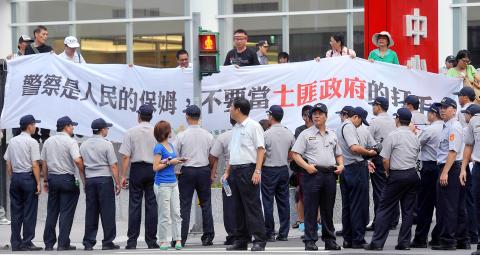The preliminary legislative review of the controversial cross-strait service trade agreement scheduled for today was temporarily postponed and two more public hearings are to be held instead in response to continuing opposition from the public to the legislature ratifying the agreement.
Academics and representatives of civic groups apprehensive of opening up the nation’s service sector to Chinese investors continued to call for lawmakers to take citizens’ opinions into account through a deliberative democracy process before the agreement is reviewed in the legislature.
Lawmakers from the Democratic Progressive Party (DPP) and the Taiwan Solidarity Union have voiced support for the demand that the impact on each industry covered by the trade agreement be discussed at a separate public hearing, with business owners and representatives of those employed in the sector invited to talk about their views before the legislative review begins.

Photo: Chien Jung-fong, Taipei Times
The Chinese Nationalist Party (KMT) did not agree to the request.
Two separate public hearings were held yesterday by a joint committee led by the Internal Administration Committee, entrusted by the legislature’s plenary session to do a preliminary review of the agreement.
The preliminary review was scheduled for today, but the KMT agreed to postpone the meeting after it turned down a request by the DPP and the TSU that protesters rallying outside the legislature be allowed to be present at yesterday’s public hearing as observers.
A total of 28 representatives from academia, business associations and civic organizations were invited to present their views on the agreement, while Mainland Affairs Council Minister Wang Yu-chi (王郁琦), Straits Exchange Foundation (SEF) Chairman Lin Join-sane (林中森) and Minister of Economic Affairs Chang Chia-juch (張家祝) were also present.
At the hall, which can accommodate hundreds of people, most of the seats were taken by legislative assistants and officials from various departments.
The government signed the agreement with China without consulting affected industries and the public, and now “you mobilized officials and legislative assistants to occupy the seats that were supposed to belong to the people,” DPP Legislator Lin Shu-fen (林淑芬) said.
KMT Legislator Lin Hung-chih (林鴻池) said that it was against the rules to allow people to attend the meeting unless they have applied to attend beforehand.
At the hearing, several representatives of groups opposing the agreement emphasized the need for lawmakers to listen to people’s opinions.
“We demand that the legislature hold a public hearing specifically for each industry and that all related information be made available before a public hearing is held,” Chung Yuan Christian University associate professor of financial law Hsu Wei-chun (徐偉群) said.
The legislature should enact a law to regulate how the government assesses the impact of trade agreements on the nation and to require the government to present what policy it will adopt for industries covered by a trade pact following its implementation so people can better predict how the liberalization will affect local industries, Hsu said.
Terry Chang (張天立), president of online bookstore TAAZE and founder of books.com.tw, said he doubted that officials involved in the negotiations have a basic understanding of the industries covered by the agreement.
“This is not a trivial thing. I call on officials to reconsider the agreement and politicians in both the blue and the green camps to put away partisanship to work together to protect the country’s publishing industry,” Chang said.

An essay competition jointly organized by a local writing society and a publisher affiliated with the Chinese Communist Party (CCP) might have contravened the Act Governing Relations Between the People of the Taiwan Area and the Mainland Area (臺灣地區與大陸地區人民關係條例), the Mainland Affairs Council (MAC) said on Thursday. “In this case, the partner organization is clearly an agency under the CCP’s Fujian Provincial Committee,” MAC Deputy Minister and spokesperson Liang Wen-chieh (梁文傑) said at a news briefing in Taipei. “It also involves bringing Taiwanese students to China with all-expenses-paid arrangements to attend award ceremonies and camps,” Liang said. Those two “characteristics” are typically sufficient

A magnitude 5.9 earthquake that struck about 33km off the coast of Hualien City was the "main shock" in a series of quakes in the area, with aftershocks expected over the next three days, the Central Weather Administration (CWA) said yesterday. Prior to the magnitude 5.9 quake shaking most of Taiwan at 6:53pm yesterday, six other earthquakes stronger than a magnitude of 4, starting with a magnitude 5.5 quake at 6:09pm, occurred in the area. CWA Seismological Center Director Wu Chien-fu (吳健富) confirmed that the quakes were all part of the same series and that the magnitude 5.5 temblor was

The brilliant blue waters, thick foliage and bucolic atmosphere on this seemingly idyllic archipelago deep in the Pacific Ocean belie the key role it now plays in a titanic geopolitical struggle. Palau is again on the front line as China, and the US and its allies prepare their forces in an intensifying contest for control over the Asia-Pacific region. The democratic nation of just 17,000 people hosts US-controlled airstrips and soon-to-be-completed radar installations that the US military describes as “critical” to monitoring vast swathes of water and airspace. It is also a key piece of the second island chain, a string of

The Central Weather Administration has issued a heat alert for southeastern Taiwan, warning of temperatures as high as 36°C today, while alerting some coastal areas of strong winds later in the day. Kaohsiung’s Neimen District (內門) and Pingtung County’s Neipu Township (內埔) are under an orange heat alert, which warns of temperatures as high as 36°C for three consecutive days, the CWA said, citing southwest winds. The heat would also extend to Tainan’s Nansi (楠西) and Yujing (玉井) districts, as well as Pingtung’s Gaoshu (高樹), Yanpu (鹽埔) and Majia (瑪家) townships, it said, forecasting highs of up to 36°C in those areas